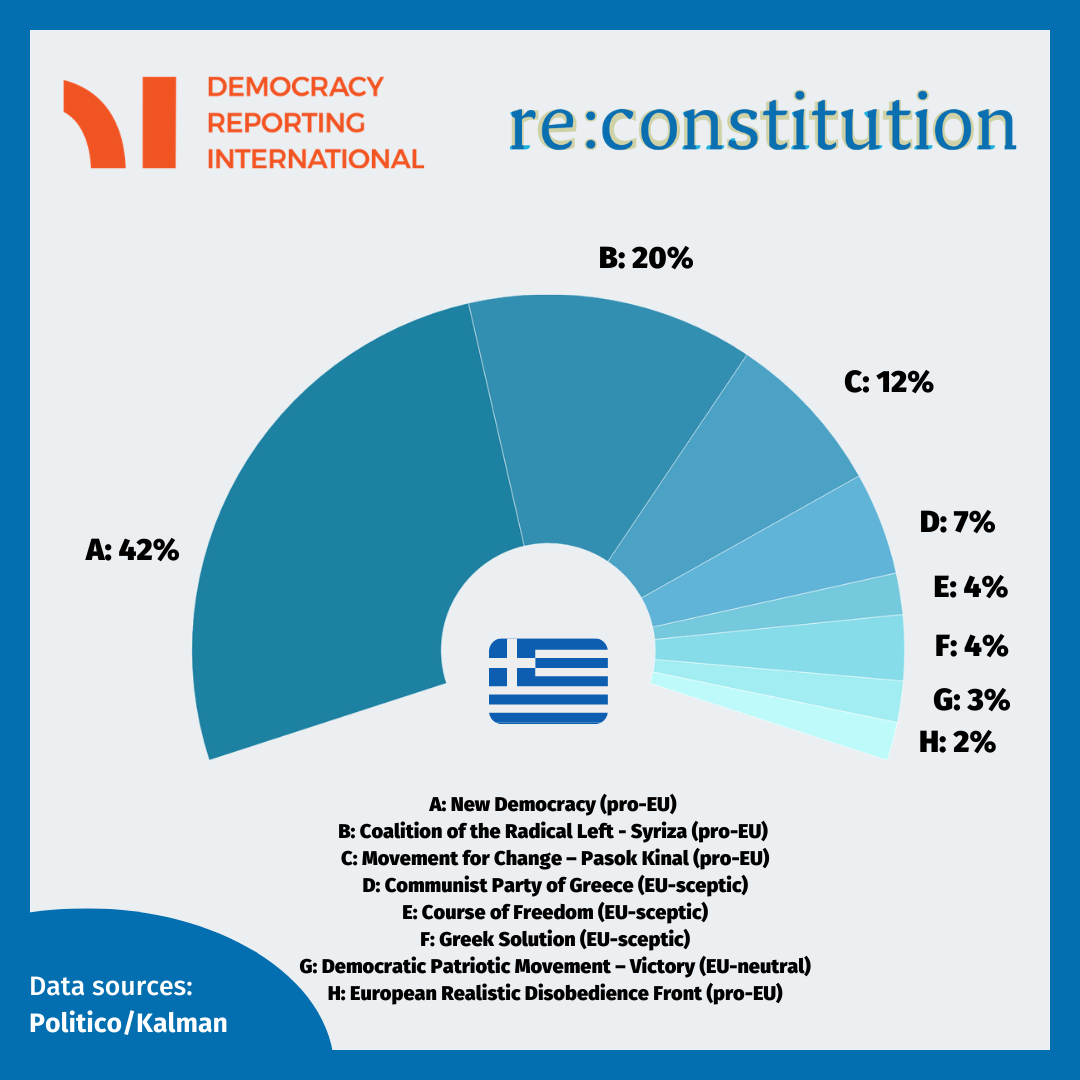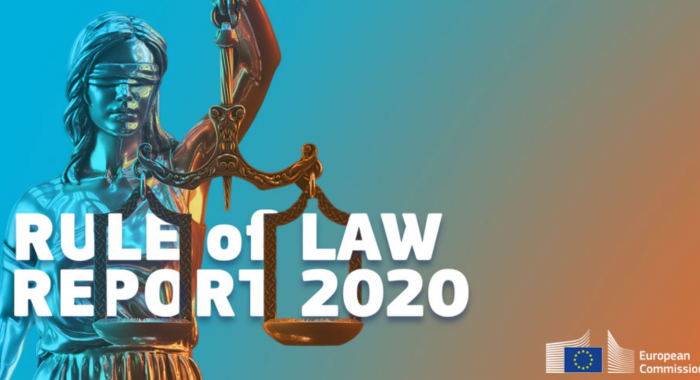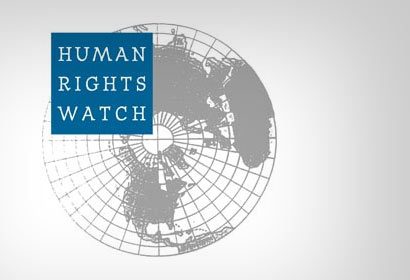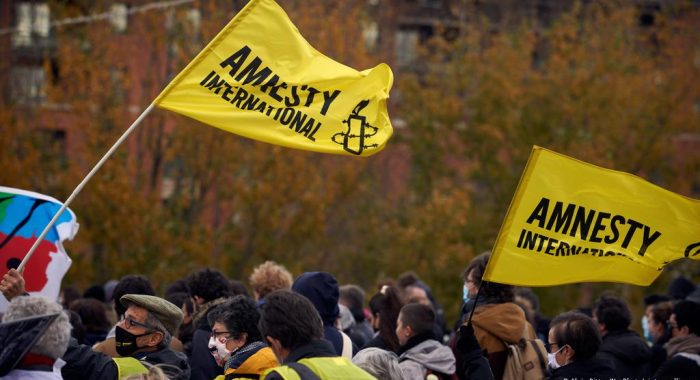

Under this system, which New Democracy reintroduced after Syriza lost the elections in 2019 (but constitutionally not yet applicable to the May elections), most seats will still be allocated through a proportional system. However, the leading party gets a bonus in seats: 20 if it gets 25 % of the votes and up to 50, if it gets 40 %. Given that New Democracy is predicted to accumulate 42 % of the vote – while Syriza is expected to get around 20 %, the majority bonus will probably be New Democracy’s pathway to power for four more years.
Rule of law issues in Greece have largely remained under the radar in recent years. The government’s pro-EU stance may have resulted in the EU turning a blind eye to these issues. However, it has been increasingly in the spotlight in the past few months in connection with the wiretapping scandal and threats to media freedom and pluralism. The World Justice Project’s Rule of Law Index has not shown a major decline in Greece yet, but Greece’s overall score is lower than those of Poland and Romania.
The European Parliament’s Committee on Civil Liberties (LIBE) highlighted ‘serious risks for the rule of law’ following a mission to Athens in March 2023. The Greek authorities did not meet the delegation, claiming that the major train crash ten days earlier needed all their attention.
The presidents of the European Parliament postponed the resolution on the rule of law in Greece and other countries, invoking the need not to interfere with elections. Earlier this year, Manfred Weber, the leader of the European People’s Party, to which New Democracy belongs, argued that the rule of law in Greece is a national matter and not a European one and hence, should not be discussed in the European Parliament.
An overarching challenge in terms of the rule of law is that checks on the government are getting weaker, providing more space for arbitrary government action. Key problems include:
The government’s surveillance of journalists and failure to investigate the murder of a reporter, Giorgos Karaïvaz, earned Greece the lowest place in the EU (107th globally) in the 2023 Reporters without Borders World Press Freedom Index. Greece’s Prime Minister responded by saying that media freedom is not an issue in the country and called the report ‘crap’.
Media freedom and pluralism have been endangered in Greece in a number of ways:
The lack of public criticism towards the ruling party can be at least partially attributed to under-reporting of rule of law issues in the media. Limited coverage of these issues can be explained by media capture and attacks on independent journalists.
As reported by journalists and civil society organisations, the National Intelligence Service systematically ordered the surveillance of politicians and journalists, invoking national security. The number of authorised wiretaps has increased substantially over the years, from 4,871 in 2015 to 11,680 in 2019 to 15,475 in 2021. Wiretapping is subject to authorisation by a competent public prosecutor attached to the National Intelligence Service. With the increasing number of authorisation requests, it is difficult to imagine thorough scrutiny of requests.
A separate issue is the alleged illegal use of Predator spyware by Greek authorities against opposition politicians and journalists. The government has argued that there is no proven link between the “lawful” but “wrong” wiretapping by the Intelligence Service with the illegal use of Predator spyware. They conceded to the surveillance, but denied that they had ever used Predator spyware.
The May 2023 report from European Parliament’s PEGA Committee (Committee of Inquiry to investigate the use of Pegasus and equivalent surveillance spyware) noted: ‘if it was not the Greek Government, then it must be concluded that a non-state actor was responsible…That would be a crime under Greek law, which would have to be investigated. The hypothesis that private actors were behind the Predator attacks is, moreover, highly implausible.’
While the government denied its purchase or use, it emerges that there were close connections and interdependencies between certain persons related to the government, the National Intelligence Service and the providers of spyware. Moreover, the Greek government provided licenses permitting the export of Predator to repressive regimes in Sudan and Madagascar.
Effective investigation into these practices is not in sight. The parliament launched an inquiry into surveillance, but the ruling party blocked many witnesses proposed by the opposition parties, including the head of the National Intelligence Service and journalists whose phones have been wiretapped or the ones that have investigated the issue. In addition, members of parliament held all inquiry meetings behind closed doors, raising transparency concerns.
These practices are damaging to the rule of law: They signal weak oversight of arbitrariness and the potential abuse of power on the part of the authorities.
The European Commission indicated in its 2022 report that ‘concerns remain regarding the appointment procedure for the most senior positions of judges and prosecutors, including the lack of judicial involvement in the selection process’ Legal sources consulted for this report express concern over governmental pressure on judges through legislative initiatives or statements on ongoing cases. In April 2023, the Vice President of the Supreme Court declared a recent legislative amendment interfered with the functioning of the Section of the Supreme Court, which rules on the legality of participation in the elections of all parties. He subsequently resigned.
According to the Eurobarometer (2022), 98 % of those surveyed believed that corruption is widespread in Greece. 90 % of businesses thought the same. 47 % of businesses agreed that corruption prevented them from winning a public tender or a public procurement contract. Transparency International’s Corruption Perception Index (2022) also reported that secretive procurement processes weaken safeguards against corruption.
The European Commission’s 2022 Report stated that in the limited cases prosecuted for corruption, substantial progress remains to be seen in issuing judgments. The Report also underlined that a large number of asset declarations were submitted, but only a few of them were verified for accuracy.
The National Transparency Authority (NTA) absorbed most audit bodies responsible for combating corruption in the broad sense. However, it was a subject of concern that the members of its governing board and its chairperson were essentially chosen by the Government and that the body was largely ineffective.
Observers have reported the shift in the treatment human rights defenders in Greece since 2019. UN Special Rapporteur on Human Rights Defenders highlighted that human rights defenders, especially organisations defending the rights of asylum seekers, migrants and refugees found it increasingly difficult to work. The UN Special Rapporteur pointed to a restrictive legislative environment, particularly burdensome registration requirements, coupled with the wide discretion afforded to the competent authorities to refuse to register applicant NGOs–as one of the biggest constraints
The European Commission also recommended Greece in its 2022 Rule of Law Report to ‘ensure that registration requirements for civil society organisations are proportionate in view of maintaining an open framework for them to operate’.
‘Nobody takes the rule of law problems in Greece seriously. It is not Eastern Europe or the Balkans, which get greater attention from the EU. Greece just falls under the radar. The government has a lot of support from the European People’s Party and several global and EU institutions, who are afraid that any other party might disturb the EU status quo, as was the case with the 2015 referendum. For this reason, EU institutions seem blind to the deteriorating rule of law, as long as other issues are not put at stake.
Political parties have not sufficiently addressed rule of law problems in the election campaign. Mainstream media does not cover these issues either. The surveillance scandal has not attracted as much attention from the public as it should have. We have witnessed that the number of surveillance orders by the National Intelligence Service has doubled during the last decade, from 7,146 orders in 2012, to 15,475 orders in 2021. Note that those numbers do not even include practices of illegal use of spyware Predator. None of these has affected election results in May. It is not surprising, however, taking into account that the opposition is weak and, most importantly, the media is largely monopolized by the New Democracy party.’
‘Ruling party politicians pressure courts by routinely making statements on pending cases and by adopting legislative amendments. The Vice President of the Supreme Court has recently resigned after publicly opposing a legislative amendment, which was perceived as a direct intervention in the internal functioning of the Supreme Court. The amendment impacted the functioning of the Supreme Court section judging the legality of participation in the elections of political parties he presided over. Essentially, the government signalled the outcome it would favour, thereby putting the court under pressure’.
Other than that, top-level appointments in the Greek judiciary are in the hands of the government. The Judiciary comes mostly from the right and decides accordingly. This creates the pool from which the government selects judges for top-level positions.’
‘A major underlying issue is the lack of checks and balances. The bodies that are expected to check on the government do not function as they should. This includes the Parliament, judiciary, media, civil society, and various independent authorities. For example, National Transparency Authority does not conduct credible investigations, often acting as a protective shield for the government. Most inquiry committees within the Parliament are under the heavy influence of the government majority in parliament thus conducting poor investigations when the government is under scrutiny. Parliament essentially acts as a long hand of the government, legitimising its every position.
For example, there was a Parliamentary inquiry on the Petsas list, the list of media outlets that received funding from the government. The criteria for granting funds used were not entirely clear. Money was essentially allocated to pro-government outlets. The Bureau of the Committee responsible for the Inquiry was only composed of members of the Parliament from the ruling party (majority) and it refused to question all the witnesses proposed by the opposition parties. In the inquiry over the Predator spyware scandal, key witnesses were not interviewed. Parliament regularly introduces last-minute problematic amendments to bills, therefore undermining the principles of good legislation and public consultation.
As regards the judiciary, high-level judges are appointed by and often loyal to the government; the ones that are not loyal are often under pressure to provide case outcomes that the government favours.’
‘Greek media is far from being free and pluralistic. There are quite a few issues, one of which has to do with the distribution of funds among media outlets. You may have heard about the Petsas list – this is a list of media outlets that received financial reimbursement for promoting the ‘Stay at Home campaign’ during the first wave of COVID. Journalistic investigation revealed that the outlets opposing the government received a disproportionally low share of the funds. This meant that partisan affiliation of the media was decisive. We filed a public information request seeking to understand the criteria for awarding funds. We never received an answer and were forced to take the case to the Administrative Court of Appeals. We got a favourable judicial outcome, but the National Transparency Authority refused to comply.
Public Broadcasting Service is under the supervision of the Prime Minister’s office. The Minister responsible for media appoints board members. The person whom they appointed as the board President was a main communications advisor to Mitsotakis, the (now former) Prime Minister and the New Democracy president.
A major problem is the concentration of (private) media ownership in the hands of a few people. Media owners are ship owners and businessmen that get contracts from the government. This is a mutually beneficial cooperation. They are not interested in changing the status quo. They exclude anyone who disagrees with the government narrative.
Increasing use of SLAPPs against journalists as well as surveillance is bound to have a chilling effect on journalists. They will think twice before criticizing the government.’
‘Civil society organizations have been under pressure and even demonised, including through media and social media. After elections, attacks might intensify. We already see some of the early signs. For example, the Parliament has recently adopted a law according to which people that are on the governing board of a non-government organization cannot be employed by the same organization. If they are, they will be deprived of state funding. This might be an issue for smaller NGOs.”
‘The current government has no effective opposition. The ruling party succeeded in controlling public media and this inevitably affected electoral outcomes. Major media outlets are owned and directly controlled by powerful economic actors. They promote economic interests and political interests that support them.’
‘Surveillance practices of the National Intelligence Service are problematic for several reasons: first, surveillance is systemic and excessive. There has been a sharp rise in numbers. Second, the prosecutor gives permits for interception without proper review. Third, the government has made things difficult for those who investigated these practices, including journalists.
The use of Predator spyware is a separate issue and we do not know much about it. There was an expectation of some sort of investigation. There were three channels: Parliamentary Inquiry, Inquiry by ADAE (the Hellenic Authority for Communication Security and Privacy), and judicial scrutiny. The ruling party has a majority in the Parliament. The inquiry they conducted was deficient. Key witnesses were not invited, and it was justified by the protection of state secrets. As regards ADAE, the top prosecutor issued an opinion stating that this body had no competence to investigate the scandal. The judiciary/prosecution did very little to investigate the case either.’
‘Several judges in top or crucial positions are conservatively inclined. For some of them, it is said that they are loyal to the ruling party. There are even allegations of unethical connections, but they are hard to prove. However, outcomes in cases involving government officials give some clues. Politicians make statements regarding judicial proceedings that are still ongoing. This is not new for Greece. The European Court of Human Rights has previously found Greece in violation of the ECHR in a similar case, Konstas v Greece.’









Bank Account number: 1100 0232 0016 560
IBAN: GR56 0140 1100 1100 0232 0016 560
BIC: CRBAGRAA
![]()
In a time where the very foundations of democracy are gradually being eroded by the rise of extreme nationalism, alt-right movements, the spread of disinformation and corporate capture, the efforts of organisations such as Vouliwatch are more relevant than ever.
We rely on the generosity of each and every one of you to continue with our efforts for more transparency and accounta
By financially supporting Vouliwatch you support our litigation strategy, our campaigns for transparency and accountability in the political system, the development of new civic tech tools, our research projects and last but not least our impartial and accurate